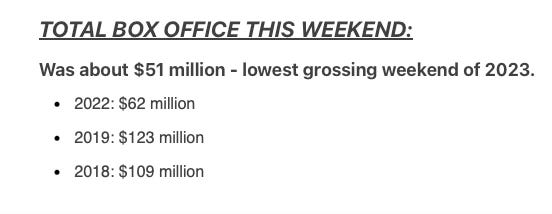
As you likely already know, last night the WGA and the AMPTP came to an agreement in principle on a new contract for screenwriters seeking employment protections and revised compensation that reflects the reality of the shifting landscape of film and TV production and distribution. The strike has lasted over 146 days, almost five months, during which time the actor’s union SAG-AFTRA has also gone on strike and the entire film and TV production industry has been shut down.
Putting aside the deal that the WGA has won and the one that SAG-AFTRA will eventually win, the cost of the AMPTP not getting a deal done with both unions prior to the strikes has reportedly outweighed any short term changes in revenue that AMPTP companies would have had to endure by simply agreeing months ago. That, to me, feels like a huge, wasteful mistake, and particularly in light of the extreme damage already done to the industry by the twin disasters of the COVID-19 pandemic and the speculative over-investment in creating an avalanche of exclusive, expensive programs for streaming platforms, which was undertaken to the detriment of a much needed and deeper re-investment in theatrical moviegoing. Just when audiences, exhibitors, and artists needed an imaginative, collaborative process to create a renewed faith in the power of the collective viewing experience, the inability to avert these strikes arrived just in time to squander all of the goodwill generated by the summer of BARBIE. It’s going to take a visionary decision like giving TAYLOR SWIFT: THE ERAS TOUR a theatrical run to renew engagement— a film operating outside of the system and on its own unique terms— but after that, what next?
Meanwhile, as the unions and studios were unable to sit and negotiate for months at a time, that tactical lack of urgency will continue to have a profound impact on, well, everyone else. Ultimately, the inability to negotiate a contract prior to a strike is an incredible self-own, but one that has implications for everyone in the industry. No, really— everyone.
By October 5, my wife, a wardrobe supervisor and proud IATSE member, will have been unable to work for five months. As partners in our family’s financial well-being, we have seen our bank accounts dwindle, our debt increase, all as we have struggled to stay ahead of the cost of living for our family. A five month shut down means we have lost 42% of her annual income. Another month (or two) to settle with SAG-AFTRA, and she will have lost over half of her income for the year. By the time production gets back up and running? Even more will have been lost.
I’ve read quite a few articles about celebrities donating millions of dollars to help crews struggling during the shutdown, and yet, not a single word from her union about if and how a single dollar of relief may be coming her way (hint: it won’t be). All of the crew members out there, working people like us trying to stay ahead of the cost of living in high-cost cities where production jobs exist, have endured this strike in solidarity, but ultimately, they will be facing months and years of playing catch-up to cover lost retirement savings, college savings and costs, lost income, and increased debt. And then, when it’s finally time go back to work, they’ll be working under the same contracts that were in place when the strikes began.
Meanwhile, at my job, the unresolved SAG-AFTRA strike remains a reset of expectations for my film festival, where we will of course support the strike guidelines for talent. This is absolutely minor in comparison to the impact on production workers, but it has shifted economic expectations for both our non-profit film festival (where, across the domestic film festival landscape, philanthropic giving has decreased, costs have gone up, and attendance has fallen and has not yet fully recovered since the pandemic) and for our non-profit cinema, where the not-too distant future holds a very challenging exhibition calendar. Just this week, the lack of publicity for films and a very limited selection of new releases has given us the worst Box Office weekend of the year:

The inability to settle these contracts has made it harder for us to engage and retain patrons, which sends a ripple down through our entire operation and budget. The impact will continue to be felt for months, and at a time when the last thing anyone needs is another set of challenges—again, this in the wake of the pandemic, the ongoing audience shift to at-home viewing, inflationary pressures on families, an over-reliance on the “same old same old” of franchises and sequels, and all of the other disincentives in place keeping people away from their once-beloved movie theaters. Swifties, it looks like we need you save yet another industry…
So, while I am glad to see the WGA winning a better deal for their members, and I hope for a quick resolution for SAG-AFTRA members, in light of the recent stripping back of streaming libraries, show cancellations, and stock market handwringing, the lack of urgency and concern for the industry wide implications in allowing this strike to happen feels like a grave miscalculation. But grave for who? Ultimately, it will be the cost to everyone else that gets overlooked once again. Until the entire industry can understand the necessity for mutual benefit and make that our most important collective priority, things will never be what they must become.



I worry about you and your family every day... xxoo